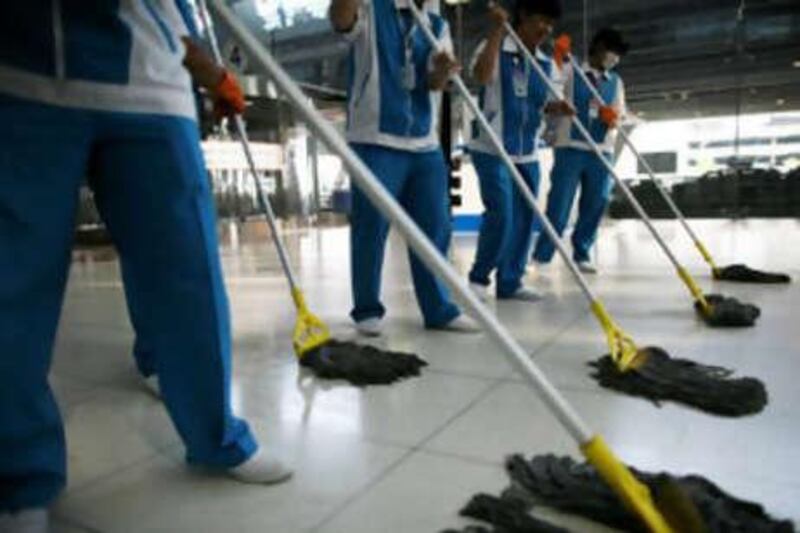BANGKOK // Thailand's King Bhumibol Adulyadej, who will turn 81 today, failed to give his traditional speech to the nation on the eve of his birthday. Instead, Crown Prince Varjiralongkorn went on radio to say his father was a "little sick". Princess Maha Chakri Sirindhorn, the king's daughter, then added that his condition was "not serious". He had "a blockage in his throat and a poor appetite," she said. Nevertheless, the king's failure to deliver his speech - the first time in 62 years - has fuelled concerns about his health at time when his speech had been more eagerly anticipated than usual. Most Thais have been anxious for him to intervene in the country's political crisis and offer a solution. In the past, he has often offered guidance in times of turmoil. His intervention in 1992, after the military junta launched a crackdown on student protesters, killing hundreds, was instrumental in ending the turmoil and providing the conditions for the re-establishment of democracy. In the past two days, an uneasy calm has descended on the capital city as the country's two opposing factions declared unofficial truces to their respective campaigns. "It's only a lull in the storm," said Kavi Chongkittavorn, a senior political editor at the English-language newspaper The Nation. "While there is a respite from the crisis for the time being. It's far from over - and both sides will resume their battle at the very first opportunity," he said. Charnvit Kasetsiri, a historian and former rector of Bangkok's Thammasat University, said: "This is nothing more than an intermission. It will not be over until the two sides of the political spectrum can reconcile, and the prospect of that happening is very bleak." The divisions that gave rise to the current problems remain, and without addressing the root cause of them, the political tensions are almost certain to erupt again, he said. "I have never known Thailand to be so divided and polarised," said Sukhumband Paribatra, a senior opposition politician running for Bangkok governor. The conflict largely follows class lines - with the urban poor, especially in Bangkok, and the impoverished farmers in the north and north-east of the country supporting the government because of their allegiance to the former prime minister, Thaksin Shinawatra, who was ousted by a military coup in 2006. The Peoples' Alliance for Democracy (PAD), wearing yellow shirts in deference to the king, have been supported by the traditional elite, including members of the palace, the urban middle class - including academics, students and merchants - trade unions and the military. On Wednesday, the PAD protesters ended their week-long occupation of the capital's two airports and withdrew from Government House, which they had held for more than three months. The PAD supporters have been trying for months to topple the prime minister, Somchai Wongsawat, accusing him of being a proxy for the former premier, Thaksin. Mr Somchai, who is Thaksin's brother-in-law, was forced out of office this week when the constitutional court disbanded the governing People's Power Party for electoral fraud and barred its top executives, including the prime minister, from politics for the next five years, For the time being, Thailand is ostensibly without a government. Although there is a caretaker prime minister in place, the country's administration has virtually ground to a halt. "The government needs to restore normal conditions as soon as possible, said Pradit Patarapasit, the acting deputy finance minister. "Right now, as an interim government we don't have much power. The situation needs a new government as soon as possible." The parliament is scheduled to reconvene next week, when it is expected to elect a new prime minister. Various candidates' names are being floated, a sign that there is no consensus among the politicians who had formed the last government. While the banned People's Power Party, following the constitutional court ruling, has effectively been reformed into the Peau Thai [For Thais] party, it remains riven with factions, each jockeying for power and privilege in the new administration. Two of the PPP's coalition partners have also been disbanded, and a total of 36 MPs from all three parties barred from political life. By-elections are scheduled for early next month. In the meantime, there is speculation that some of the politicians from the dissolved parties may join the Democrat party or at least cross the floor and join the opposition benches in parliament. Few analysts believe the Democrats will be able to form a government when parliament reopens. Senior military officers have been active behind the scenes trying to get MPs to join the Democrats in a national unity government, according to sources close to the army chief. "This would certainly be the best solution for Thailand - a national unity government that rules for a year or 18 months and lays the ground for free and fair elections," Mr Sukhumband said. Many analysts now believe only fresh elections can prevent renewed political conflict on the streets, which would certainly end in the military taking control again. "Dissolving parliament and calling a snap poll is the feasible way out of the current political crisis - albeit a temporary solution," said Thitinan Pongsudhirak, a political scientist at Bangkok's Chulalongkorn University. "A general election would give the political parties a break from the current deadlock." ljagan@thenational.ae
King misses speech as crisis grows
Thailand's King Bhumibol Adulyadej fails to give his speech to the nation as the clean up begins at the end of the seige.

Editor's picks
More from the national




